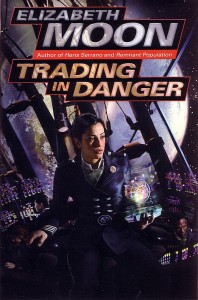There are two principal ways in which this book (and those that follow, one would presume), is particularly strong.
The first, and more subtle, is the credibility of descriptions of military behaviour and composure under pressure. I hadn’t entirely understood why certain aspects of the heroine’s behaviour seemed so believably military-cadet-like until I learned that Elizabeth Moon has a military background herself.
The second particular strength is the nature of the world that’s being described as a backdrop to the story. With a far-flung empire and obligatory travel time measured in weeks and months rather than days, a kind of rule-by-consensus evolves. The distance and time involved in travelling from one point to another maintains and enhances the importance of shipping and transport while diluting the ability of any central authority to exercise control or to enforce a particular set of rules. Finally, it gives disproportionate power to anyone capable of bridging those distances with either information or matter, and those who have that sort of power have a strong incentive to hang on to their monopoly of it.
So it is that Kylara Vatta, after being thrown out of a military academy for rather spurious reasons, finds herself earning her way back into her family’s graces (and being conveniently moved away from the epicentre of the scandal she’s created by getting thrown out of the academy) by captaining a ship that’s due for salvaging at a location a few months travel from home.
Her genetic heritage – a desire to make the best of every situation and a constant search for trade and profit – manifests halfway through the journey as she spies an opportunity for some lucrative work if she makes a small detour. From there things slide downhill fast as she finds herself inadvertently embroiled in a complex fight between unknown but very powerful organizations, while still piloting nothing more than her ready-for-the-scrapheap outdated trading vessel.
Some weaknesses in the narrative comes in counterpoint to its strengths. While the military background of those characters that deserve one is impeccable, the character descriptions fall a little flat when we look at the civilian and emotional aspects. Specific character traits are explained, demonstrated, explained again, analysed in excruciating detail through italicized internal monologues, and then analysed and examined some more a few paragraphs later because we may not have gotten the message the first time. Ky’s affinity for combat, her complexes regarding the way she’s perceived by her family (too nice to strays), her dilemma about getting involved or becoming independent of her family – it is all over-explained, it comes back too often, and it moves forward too slowly to merit the many lines of text dedicated to the subject.
In terms of the very interesting concept that law and order become fungible and difficult to enforce over the vast distances of space, the idea is great, but disappointingly under-utilized. We spend more time worrying about whether we can trust the people in the ship, or whether Kylara can get over her first love affair, than examining the concept of how society and those who wish to further it struggle to protect against those who would take advantage of the relative lawlessness of space. We get aspects of this – the existence of militias and mercenaries in particular – and the genesis of the story more or less depends on the premise, but it’s rarely dealt with head-on in the text.
That said, despite being very linear and having some character balance issues (Kylara is the only properly developed character in this first book), the story works both as a by-the-numbers space thriller, executing a simple plot well, and as a coming of age story for a young heroine who discovers her strengths as she exercises them. For a young adult crowd, an excellent demonstration that science fiction can be fertile soil on which to grow adventure stories.
I enjoyed the book very much, even if I don’t think it’ll be winning any literature prizes.




